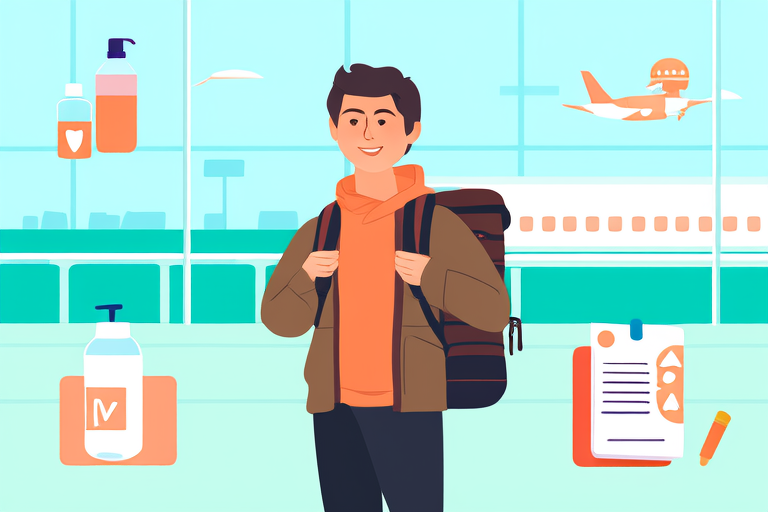How to Stay Healthy While Traveling: A Comprehensive Guide to Effective Travel Preparation
Introduction
Traveling is an exciting adventure that allows us to explore new cultures, meet interesting people, and create lasting memories. However, it can also be a time when our health is compromised due to changes in environment, diet, and routine. Proper preparation is key to ensuring that you stay healthy during your travels. In this comprehensive guide, we will cover essential tips and strategies to help you maintain your well-being while exploring the world.
Understanding the Risks of Travel
Common Health Challenges on the Road
Traveling often exposes us to new environments, which can pose various health risks. One of the most common issues is jet lag, caused by crossing multiple time zones. This can disrupt your sleep patterns, leaving you feeling fatigued and disoriented. Additionally, changes in water quality and food safety standards can lead to gastrointestinal problems such as diarrhea or food poisoning. Exposure to unfamiliar allergens or pollutants may also trigger respiratory issues for those with asthma or allergies.
Preventive Measures Against Travel-Related Illnesses
To minimize these risks, it’s important to take preventive measures before embarking on your journey. Start by consulting a healthcare provider about any necessary vaccinations or medications. Depending on your destination, you might need protection against diseases like malaria, hepatitis A, or typhoid fever. It’s also wise to carry a basic first-aid kit with items like antacids, anti-diarrheal medication, pain relievers, and band-aids.
Preparing Your Body for Travel
Adjusting Your Sleep Schedule
One of the best ways to combat jet lag is to adjust your sleep schedule gradually before your trip. If you’re traveling eastward, try going to bed earlier each night leading up to your departure. Conversely, if you’re heading west, delay your bedtime slightly. This helps align your internal clock with the time zone you’ll be entering, making the transition smoother once you arrive.
Staying Active During Travel
Maintaining physical activity is crucial for overall health, especially when you’re away from home. Even short walks around your hotel or sightseeing spots can keep your muscles active and improve circulation. Consider packing light exercise gear like resistance bands or a yoga mat so you can stretch or do some light workouts in your room. Regular movement also helps prevent stiffness and soreness from sitting for long periods during flights.
Navigating Food and Water Safety
Choosing Safe Eating Options
When dining out, opt for restaurants that have high hygiene standards and busy kitchens, as they tend to prepare food more frequently. Stick to well-cooked dishes rather than raw or undercooked meats and seafood. Avoid street food unless you know it’s prepared in clean conditions. Drinking bottled water is generally safer than tap water in many countries, but if you must drink local water, boil it first or use water purification tablets.
Hydration Tips for Travelers
Dehydration is another concern, particularly in dry climates or at higher altitudes. Make sure to drink plenty of fluids throughout the day, even if you don’t feel thirsty. Carrying a reusable water bottle allows you to refill easily without contributing to plastic waste. Electrolyte drinks can also help replenish lost minerals after sweating or diarrhea.
Mental Wellbeing During Travel
Managing Stress and Anxiety
Travel can sometimes bring stress and anxiety, especially if things don’t go according to plan. To manage these feelings, practice mindfulness techniques such as deep breathing exercises or meditation. Setting realistic expectations and being flexible about minor inconveniences can also reduce frustration levels. If possible, build downtime into your itinerary to relax and recharge.
Cultivating Positive Relationships
Building connections with locals or fellow travelers can enhance your travel experience significantly. Engaging in meaningful conversations fosters mutual understanding and enriches cultural exchange. Join guided tours or group activities where you can meet like-minded individuals who share similar interests.
Practical Checklists and Tips
Essential Items to Pack
- Medications: Bring enough prescription drugs for the duration of your trip plus extra just in case.
- First Aid Kit: Include band-aids, antiseptic wipes, painkillers, etc.
- Personal Hygiene Products: Hand sanitizer, wet wipes, etc.
- Electrical Adapters: Ensure compatibility with local power outlets.
Emergency Contacts List
Always have contact information for emergency services (police, fire department) readily available along with numbers for your embassy/consulate abroad.
Conclusion
In conclusion, staying healthy while traveling requires thoughtful planning and adherence to good habits. By addressing potential health hazards proactively and taking care of both physical and mental aspects, you can enjoy a safe and enjoyable trip. Remember to consult healthcare professionals beforehand, stay hydrated, eat wisely, and maintain social connections. With these tips in mind, you’ll be better equipped to handle whatever comes your way during your adventures overseas. Happy travels!
